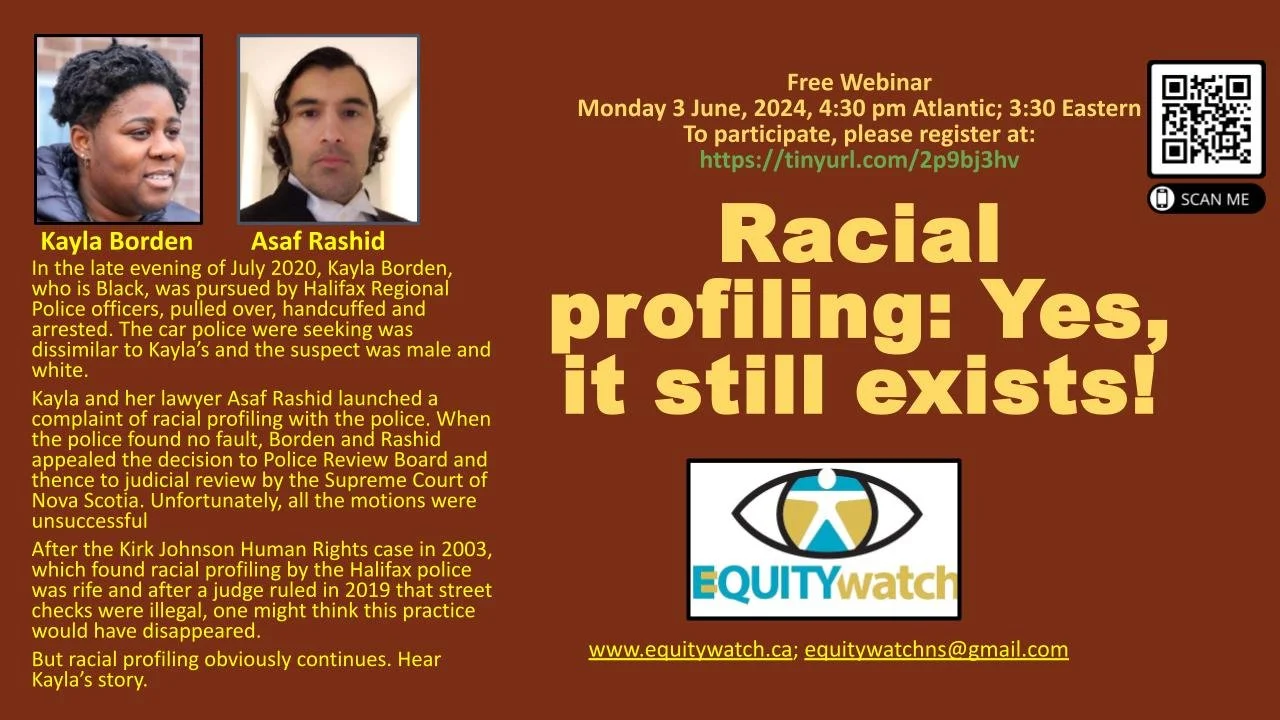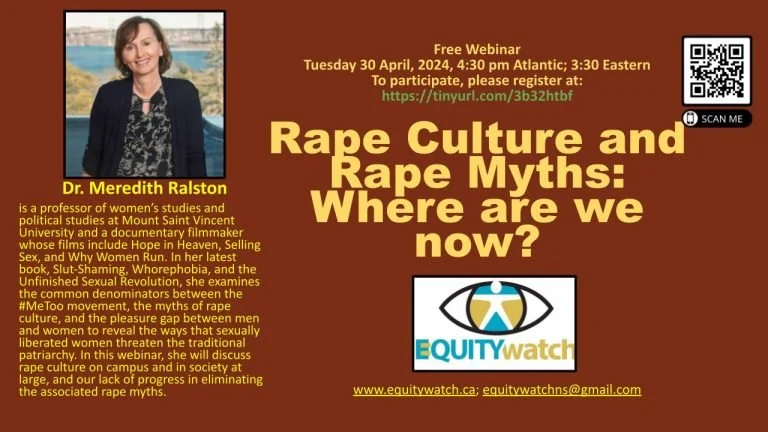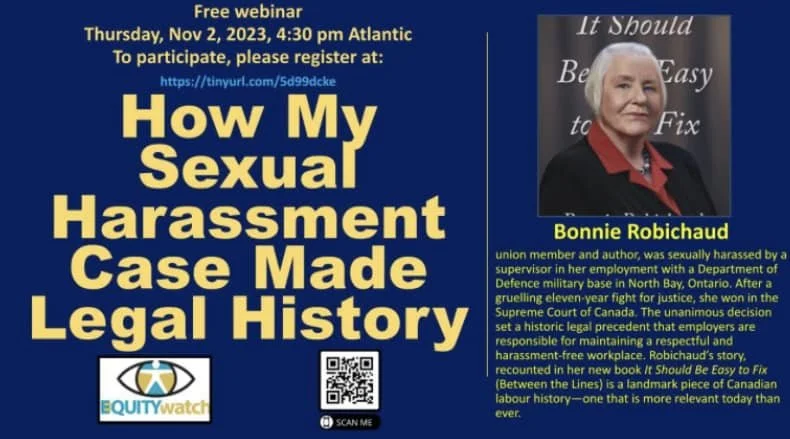
Below are some of the over forty webinars that Equity Watch has presented, with links to recordings
(in progress)
Watch the recording HERE.
Sarah Stein Lubrano, Phd, is an expert on cognitive dissonance: the reasons why people cling on to ideas and prejudices that contradict their values. Max Haiven Phd, is an expert on the radical imagination: that force that inspires people to fight for different futures. Together, they run Sense & Solidarity, an organization that hosts workshops (online and in-person) and podcasts that help social movements understand what really works to change hearts and minds. In this presentation, Sarah and Max offer some key points from their research and engagements with activists. They ask us to think again about ideology: dominant and often oppressive ideas and paradigms that most people take for their own unique thoughts. Challenging ideology is not as easy or straightforward as it seems. For example, arguing with people and “proving them wrong” almost never works. What does?
Watch the recording HERE.
Camellia Bryan is assistant professor in the Organizational Behaviour and Human Resources Division of the Sauder School of Business (University of British Columbia).
Her research focuses on uncovering the drivers of resistance and backlash against diversity in organizations. She delves into the cognitive, emotional, and social processes underpinning individuals' rejection or resistance to diversity initiatives. This understanding guides the development of effective interventions to overcome these barriers to diversity and foster inclusion.
Watch the recording HERE.
Amy Blanding was director of inclusion, diversity, equity and accessibility at the Northern Health Authority of British Columbia for six years. She is now suing her employer for wrongful dismissal and denial of her Charter rights.
The dispute revolves around her off-work activity as a social justice advocate and singer-songwriter and her opposition to the killing of over 42,000 people in Gaza over the past year.
Her supervisor, Vash Ebbadi-Cook, resigned from Northern Health in protest against the treatment of Blanding.
This case will concern all in EDI concerned about the limits of free expression.
Watch the recording HERE.
Syd Blum is a community, political, and union organizer living in Mi’kma’ki / Nova Scotia. They are the Organizer for the Halifax Workers’ Action Centre, a Community Legal Worker at Dalhousie Legal Aid, and the Vice-President of IATSE Local B-778. Their previous experience includes being the Head Organizer with the ACORN Tenant Union, where they led successful campaigns for rent control and anti-eviction policies in Atlantic Canada, and as a cooperative developer with the UCI in BC. They have a profound commitment to building a strong labour movement in Nova Scotia, fighting for a union at home, at work, and in our communities
In the late evening of July 2020, Kayla Borden, who is Black, was pursued by Halifax Regional Police officers, pulled over, handcuffed and arrested. The car police were seeking was dissimilar to Kayla’s and the suspect was male and white.
Kayla and her lawyer Asaf Rashid launched a complaint of racial profiling with the police. When the police found no fault, Borden and Rashid appealed the decision to Police Review Board and thence to judicial review by the Supreme Court of Nova Scotia. Unfortunately, all the motions were unsuccessful
After the Kirk Johnson Human Rights case in 2003, which found racial profiling by the Halifax police was rife and after a judge ruled in 2019 that street checks were illegal, one might think this practice would have disappeared.
But racial profiling obviously continues. Hear Kayla’s story.
Watch the recording HERE.
Dr. Meredith Ralston is a professor of women’s studies and political studies at Mount Saint Vincent University and a documentary filmmaker whose films include Hope in Heaven, Selling Sex, and Why Women Run. In her latest book, Slut-Shaming, Whorephobia, and the Unfinished Sexual Revolution, she examines the common denominators between the #MeToo movement, the myths of rape culture, and the pleasure gap between men and women to reveal the ways that sexually liberated women threaten the traditional patriarchy. In this webinar, she will discuss rape culture on campus and in society at large, and our lack of progress in eliminating the associated rape myths.
Watch the recording HERE.
Clarisse Paron is a PhD student at Dalhousie University. She specializes in ethics, philosophy of science, and feminist/disability theory. Her research considers how science, medical practice, and social policy intersect to perpetuate unjust treatment of equity-deserving populations in the healthcare system. In particular, her dissertation focusses on the prevalence of fatphobic biases and mistreatment of those who are considered medically overweight. In this webinar, she will discuss how medicine reinforces social stigma against fat bodies, and how these attitudes justify and reinforce discrimination in the workplace and society at large.
To watch the recording of this video, click HERE.
Connors Smithers-Mapp, former Atlantic Regional Director of the National Council of Visible Minorities Employees in the Federal Public Service, which was the largest, representative body of its kind in Canada.
A lawyer by profession Connor is principle of Nile Consulting, specializing in legal, business and equity consulting, as well as conflict resolution, mediation and anti-racist education
Have "Equity, Diversity and Inclusion" programs lived up to their claims to bring about more inclusive and discrimination-free workplaces?
Or are they mere tokenism, full of flaws and the same systemic weaknesses they are meant to rectify?
Watch the recording HERE.
Ron Stockton Up to recently, unions often encouraged members with human rights complaints to pursue those complaints, not through the union, but at human rights tribunals.
However, as of November, 2021, the Supreme Court of Canada, in the Horrocks case, moved the goalposts, ruling that human rights complaints of unionized employees in most provinces are the exclusive jurisdiction of labour arbitrators.
Ron Stockton, a Halifax-based union-side labour lawyer, argued one of the first such cases in Nova Scotia. And when the Board of Inquiry claimed it had no jurisdiction, the case went to the NS Court of Appeal, which overturned the Board and sent the case back for hearing.
Ron will explain the challenge for unions.
Watch the recording HERE.
Jason Foster is the director of Parkland Institute and an associate professor of Human Resources and Labour Relations at Athabasca University. He has worked as a policy analyst for non-profit organizations and more than a decade as director of policy analysis of the Alberta Federation of Labour. He is the author of Gigs, Hustles, & Temps (2023) and Defying Expectations: The Case of UFCW Local 401 (2018), as well as co-author of Health and Safety in Canadian Workplaces (2016). His research interests include workplace injury, union renewal, labour and employment policy, and migrant workers in Canada.
Watch the recording HERE.
Bonnie Robichaud union member and author, was sexually harassed by a supervisor in her employment with a Department of Defence military base in North Bay, Ontario. After a gruelling eleven-year fight for justice, she won in the Supreme Court of Canada. The unanimous decision set a historic legal precedent that employers are responsible for maintaining a respectful and harassment-free workplace. Robichaud’s story, recounted in her new book It Should Be Easy to Fix (Between the Lines) is a landmark piece of Canadian labour history—one that is more relevant today than ever.
To watch the recording of this video, click HERE.
David Bush is a labour rights advocate and works with the Ontario-based Income Security Advocacy Centre. He is active with Justice for Workers.
The government of Canada defines gig workers as “workers who enter more casual work arrangements such as short-term contracts with firms or individuals to complete specific and often one-off tasks. Gig work is often facilitated by new technologies such as digital labour platforms.”
Problem is, most gig work falls outside of labour standards and collective bargaining regulation. Those who employ them insist they are “self-employed.”
Unions are trying to organize gig workers, but recently the United Food and Commercial Workers signed a deal with Uber where the union falls well short of traditional representation.











